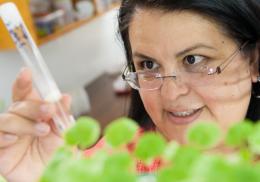Breaking the language barrier

Workers at Oregon’s nurseries are on the front line in making sure their plants are healthy. But some don’t speak English, have limited education, and don’t have formal training in horticulture. So if they come across an infected plant, they might not be able to diagnose the cause or understand why it’s important to tell their supervisor so any potential spread of disease can be curtailed. If action isn’t taken, sick plants can mean lost income for nurseries.
[caption caption="Luisa Santamaria, plant pathologist and bilingual educator at NWREC. (Photo by Lynn Ketchum.)"] [/caption]
[/caption]
But Luisa Santamaria, the bilingual plant pathologist at Oregon State University’s research center in Aurora, has a solution for that. In classes offered primarily in Spanish, she teaches nursery workers how to prevent the introduction and spread of diseases and pests. She tours their greenhouses and fields with them, pointing out potentially problematic areas. Then she helps them develop a list of best practices. For example, workers learn not to overwater to prevent Phytophthora and Pythium water molds. She advises workers to space plants out so air can circulate and dry any water on the leaves. She also encourages them to water in the morning when it’s cooler, so dangerous spores don’t germinate. Additionally, she teaches workers to sanitize their tools, like clippers, which can transmit microorganisms from one plant to another. Employees also learn about the importance of disinfecting pots before reusing them, and why reusing untreated water could spread diseases.
Since starting these workshops in 2010, Santamaria has trained more than 340 people from 24 businesses. About 40 of these employees were from two Christmas tree farms. They learned to scout for and address problems like root rot, aphids, and fungi. Santamaria shared with them a bilingual pocket guide that she co-authored called “Identifying and Managing Christmas Tree Diseases, Pests, and Other Disorders.”
She has also helped berry growers prevent outbreaks of foodborne illnesses. Through workshops in Spanish and English, she has trained more than 300 contractors, farm owners, and managers how to teach their own fieldworkers about preventing contamination during the harvest season. The trainings were in response to a 2011 outbreak of E. coli caused by deer droppings on an Oregon strawberry farm. Seven people were hospitalized and an elderly woman died.
